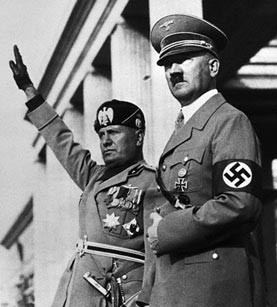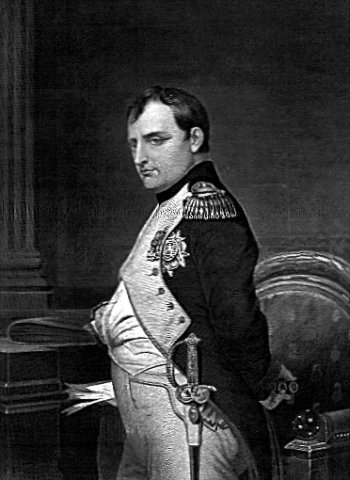Dictatorship
|
|

A dictatorship is a government headed by a dictator or more generally any authoritarian or totalitarian government. It is considered to be the polar opposite of a minarchist constitutional republic. A dictatorship is often seen as equivalent to a police state, but the term dictatorship refers to the way the leaders gain and hold power, not the watch kept on the citizens. Some dictators have been popular enough not to have to employ very many oppressive measures. The term generally has a pejorative meaning in reference to a government that does not allow a nation to determine its own political direction by popular election.
Originally a legitimate military office in the Roman Republic, a "dictator" was an official given emergency powers by the Senate. The dictator had absolute power, but for a limited time. This was initially intended to deal with some state of emergency. In modern times, claims of such states of emergency are often used to justify seizures of power and suspensions of civil rights.
| Contents |
Styles
In the 20th century, the term dictatorship has come to mean a form of government in which absolute power is concentrated in the hands of a dictator and sometimes his supporters; it can also refer to the consolidation of power by a single-party, military, head of state, or head of government. Dictators had several characteristics:
- Many dictators have held the formal title of "President", but wield extraordinary, often non-constitutional or de facto powers. In the case of many African or Asian former colonies, after achieving their independence, the presidential regime was gradually transformed into a dictatorship, but the title nominally remained. Dictators rarely hold titles like "prime minister" because that position suggests a secondary status to a Head of State.Communist dictators, by contrast, often held different titles, such as "General Secretary."
- Some dictators that have come to power by a military coup gain or continue to hold a military post - this is the common case in the Latin American dictatorial regimes.
- The fascist regimes created in Europe after World War I brought back ancient national and religious traditions, confronting them with political models considered to be foreign or imposed by foreigners (an euphemism for democracy).
Types of dictatorships
Dictators can come to power in a variety of different ways. They can:
- be elected into power;
- In a dictatorship, there are no regular, fair, and competitive elections. However, sometimes dictators can initially obtain power from democratic elections, but shortly after being elected the dictator will ban all opposing parties and cancel all future elections. Though free elections will never occur under a dictatorship, sometimes dictators orchestrate show elections in an attempt to grant themselves some illusion of democratic legitimacy and public support. Usually, the dictator runs for "re-election" unopposed, with voters being asked to answer a simple "yes or no" ballot on the leader's continued rule. As can be expected, coercion and corruption usually plague such "elections" and dictators will often claim unrealistically high voter turnouts and results.
- be appointed by the resident ruling party hierarchy;
- inherit their position from a deceased relative (see below);
- Often, a dictator creates what is known as a family dictatorship in which leadership of the country passes to the dictator's son, brother, or other relative after his death. This makes the country into a sort of monarchy.
- seize power in a coup d'état .
"Dictatorship of the proletariat"
The dictatorship of the proletariat is defined by Marxist theory as the use of state power by the working class against its enemies during the passage from capitalism to communism, entailing control of the state apparatus and the means of production. After this intermediate socialist phase, Marx theorized that communism's final stage would be a classless society in which the bourgeoisie has been eliminated and the masses (the proletariat) have full control.
Vladimir Lenin, leader of the Bolsheviks during the First Russian Revolution and first ruler of the Soviet Union, created the concept of the "vanguard of the proletariat." He believed that a successful Communist revolution could be achieved by professional revolutionaries who would presumably represent the proletariat. Lenin's expansion upon Marx's original theory of communism came to be known as Marxism-Leninism, an ideology that held significant worldwide influence following the successful Bolshevik Revolution in Russia. Under Joseph Stalin the phrase, in practice, also essentially came to be understood as a dictatorship in the name of the proletariat.
History of Dictatorship
For most of history dictatorship has been the most common form of rule. In early European history power was held by a variety of absolute monarchs who ruled their kingdoms with virtually unlimited powers. As the years went on, political liberalism began to spread, and so too did the rise of nation states, constitutions, and democracy. Monarchs lost most of their powers to elected assemblies and in some cases were abolished altogether, and replaced by republics. In several countries such reforms spiraled out of control, and amid the power vacuum created, certain leaders would arise out of the confusion and seize control. Following the French Revolution, for example, power was rapidly consolidated by future dictator Napoleon Bonaparte. Still, it can be argued that Napoleon's rule was not any more autocratic than that of most neighbouring monarchies.

In the postwar period, the wave of de-colonization in Africa yielded many forms of non-democratic government, especially military dictatorships, in large measure due to the historical development of the colonial-state in several stages. Consolidation of the colonial-state rarely entailed strong institutionalization, regularization, and rationalization of colonial administration. For the most part, colonial administration relied on narrow support-bases, which essentially consisted of networks of indigenous collaborators, in order reduce the cost of bureaucratic and military administration. In that vein favoritism dominated, as colonial powers played local populations against each other, and fostered elite classes of political collaborators. Upon independence, the newly independent states - poorly equipped to govern due to weak institutions, the lack of popular representation, conflict over the allocation of resources and power, and problems of stateness - were often left with power vacuums, and dictatorship of many variants were likely to fill the void.
The Cold War greatly increased the number of dictatorships, with many dictators able to seize or consolidate power by catering to the interests of either superpower. Upon the end of the Cold War, a series of non-democratic governments (including the Soviet Union itself) quickly collapsed, or met demands for democratization without having collapsed, and were replaced by transitional governments, which have been, in many cases, steps toward democratization. However, many regime openings have resulted in the emergence of new non-democratic regimes.
Today, dictatorship has reached an all time global low. Transitions to democratic rule have occurred in nearly all Western states. Democratization has made great strides in Latin America as well. However, non-democratic governments remain common in Africa and Asia.
A global diffusion effect, stemming from the waves of democratization in Southern Europe in the 1970s, Latin America in the 1980s, post-Communist Europe in the late 1980s and early 1990s, and finally Sub-Saharan Africa in the 1990s, has arguably rendered the application of citizenship to government institutions, the "spirt of the times" across many regions.
Regimes that have been described as dictatorships
Europe
- Spain (1923-1930) led by Primo de Rivera
- Spain (1939-1975) led by Francisco Franco
- Nazi Germany (1933-45), led by Adolf Hitler
- Fascist Italy (1924-43 and 45), led by Benito Mussolini
- Communist Russia/Soviet Union (1917-91), most notably under Vladimir Lenin 1917-24 and Josef Stalin 1928-53
- Communist Romania (1947-89), notably led by Nicolae Ceauşescu (1965-1989)
South America and The Caribbean
- Chile (1973-1990) led by Augusto Pinochet
- Cuba (1959-) led by Fidel Castro
- Dominican Republic (1931-1961) led by Rafael Trujillo
- Haiti (1964-1986), led by François Duvalier, then Jean-Claude Duvalier
- Nicaragua (1936-1979) under the Somozas
- Argentina (1946-1955; 1974) under Juan Peron
Africa
- Central African Republic (1966-79) under Jean-Bédel Bokassa
- Uganda (1971-79) under Idi Amin
- Zimbabwe (1980-) under Robert Mugabe
- Libya (1970-) under Muammar al-Qaddafi
Asia
- Republic of China (1949-1988) under Chiang Kai-shek (1949-1975) and Chiang Ching-kuo (1975-1988)
- People's Republic of China (1949-), notably under Mao Zedong 1949-76
- Indonesia under Suharto (1967-98)
- North Korea (1948-) under Kim Il-sung 1948-1994 and Kim Jong-Il 1994-
- Iraq under the Ba'ath Party (1968-2003), notably under Saddam Hussein 1979-2003
- Afghanistan under the People's Democratic Party of Afghanistan (1978-92) and the Taliban, Al-Qaeda's key ally led by Mullah Mohammed Omar (1996-2001).
- Philippines under Ferdinand Marcos 1972-1986
- Iran under Mohammad Reza Pahlavi (1941-1979), Ruhollah Khomeini (1979-89) and Ali Khamenei (1989-)
- Japan under Tojo Hideki (1941-44)
See also
- Absolute monarchy
- Totalitarianism
- Total war
- Plutocracy
- Kleptocracy
- Generalissimo
- Military rule
- Military dictatorship
- Police state
- Elective dictatorshipbs:Diktatura
ca:Dictadura cs:Diktatura da:Diktatur de:Diktatur es:Dictadura fr:Dictature it:Dittatura he:דיקטטורה la:Dictatura lt:Diktatūra nl:Dictatuur ja:独裁政治 no:Diktatur pl:Dyktatura pt:Ditadura ro:Dictatură simple:Dictatorship sk:Diktatúra fi:Diktatuuri ru:Диктатура sv:Diktatur zh:专政
